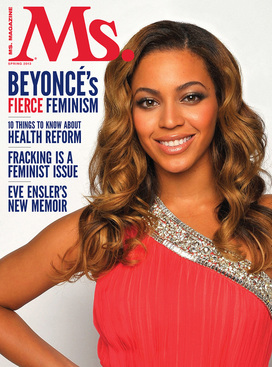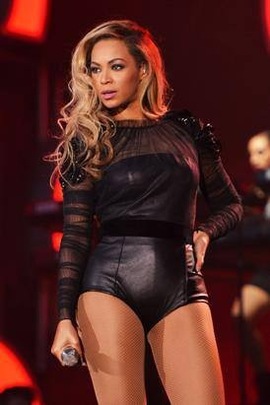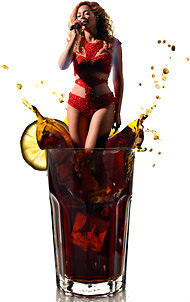 Bey covers feminist mag, Ms. (Spring 2013)
Bey covers feminist mag, Ms. (Spring 2013) Beyonce` became the focus of feminist debate and discussion with several “girl-power” anthems that resulted in being labeled “a male-basher” by men and plenty of her own interview comments regarding inspiring women (comments that have gotten only more political and forthright with time). Much of media quickly pegged her the new face of feminism in music and a great example to women and girls. Meanwhile, this was/is challenged by some feminists primarily because of her sex appeal, lyrical content and most recently, her marriage. In my 2011 article, “Beyonce Isn’t a Feminist?” I explained why I believe the arguments that she isn’t a feminist because “she’s too sexy” and “sings about love too often” are bogus and reinforce stereotypes about the movement. Despite being one of the few current pop acts to be so vocal about gender, Beyonce’s efforts are habitually snubbed and ridiculed. Beyonce` raised money & headlined a concert for the women’s organization Chime for Change, but it was said performing in a “sexy leotard” was countering. Even though she was clearly encouraging women to not let men take advantage of their emotional love and loyalty by being casual in relationships and not committing with 2008’s “Put a Ring on It,” the song was described as limiting female value to marriage. Although “Run the World (Girls)” had lyrics that addressed economic disparity, encouraged men to respect our strengths, boasted education and how we successfully handle motherhood & business, its music video was slammed because, again, the costumes were “too sexy” and the part in which the women-warriors dance in front of stunned male guards symbolized sexual subjection, not the confrontation Beyonce` intended it to be.
On the other side of the feminist community, agitation boils amongst those who welcome Beyonce’s presence and find all the inspection to be judgmental, nit-picky and even racially biased. A few blog articles (including “Okay, Lay Off Beyonce` Already” by Feministe) have gone so far as to imply some of the criticisms are ironically anti-feminist themselves and do the very thing they charge Beyonce` with: shaming women and supporting the views of a male dominated society. Some black feminist writers contend that Beyonce` is just another woman of color whose feminism is unfairly scrutinized and measured, while other white, more controversial figures in the discussion go without evaluation. Writer Lauren Rankin (who is Caucasian) highlighted that Lena Dunham’s, the star of the TV series “Girls,” status as a feminist is never questioned, in spite of her character being far more sexualized than Beyonce’s real-life image. The “is she or is she not” dialogue surrounding Beyonce` is so thick, Rutgers University designed a women’s and gender studies course based on it, entitled “Politicizing Beyonce`.” The definitive sign that “stuff got real” was when “Ms.” magazine, the first major feminist publication started by key leader Gloria Steinem, put the King B on the cover with the headline “Beyonce’s Fierce Feminism (the piece reportedly reviewed both sides of the debate),” receiving major backlash.
 "Chime for Change" attire (2013)
"Chime for Change" attire (2013) One of my friends said to me that she has trouble getting involved with feminism because it seems so divided. Any and every movement has different schools of thought. A perfect example of this is the racial civil rights movement of the 1960’s. Martin Luther King was a peaceful protestor, while Malcom X initially had a “by any means necessary” approach. I think the divide within feminism stems from having trouble defining what empowerment looks like, especially in terms of sexuality. For example, is sexual feminist empowerment being able to express sexuality the way men do it? Is it refusing to use makeup or wear form-fitting clothing? Is it not being sexually arousing? Where do you draw the line between being a sex object and sexually empowered? Is everyone free to define ‘feminist’ for themselves or is there a decisive guideline? The one thing everyone can agree on is that feminism is fundamentally about advocating for and protecting the freedoms and social rights of women and combating inequalities.
I love Beyonce’s brand of feminism. I don’t agree with every move she makes, hence this section being called “Seriously, Beyonce`, WTH?!,” but I of course generally like what she’s on. I find her brand to be beneficial because she doesn’t fit into any extreme paradigm. She’s not a submissive doormat, self-exploiting puppet who’s unaware of gender conditioning, nor is she a man-hater who’s against marriage and childbirth. She’s alluring and can be anyone’s fantasy, but she hardly crosses over into tawdry territory. Intelligent and attractive go in the same sentence with her. She loves being a wife and mother, but emphasizes those aren’t her only roles. Her well-rounded representation of feminism breaks free of any constrictive and rigid expectations or classifications, from feminists or from a male-dominated society. She truly embodies the feminist ideal of choice. She runs her own machine (now more than ever as she manages herself).
Most artists clamor at the thought of being a purported role-model, but Beyonce` happily embraces it, conscious of how much change and positivity she can cultivate with the influence of her work and famous name. She could use her art to push anything, but she consistently employs it to try to uplift and motivate women, constantly accentuating self-efficacy and personal growth. Every time she accomplishes something, it’s two points for women and African-Americans. I’ve said this before on my site, but one of the main things I’ve learned from Beyonce` is to always expect the most and the best from myself and my life. That sounds simple, but many women find themselves feeling incomplete or in horrid situations because they don’t value their life enough to have standards for it. I’m always looking at Beyonce` and thinking “How can I raise the bar for myself? What’s the next thing? Am I doing enough with my life? How can I be a better person than I was last year? How can I grow? What have I learned so far?” When I feel completely inept or helpless, she makes me feel capable. I don’t know about anyone else, but feeling capable is one of the most important things to me. I could go on forever about how Beyonce` inspires me; the moral is that I clearly deem her to be a suitable feminist icon and symbol. If nothing else, for better or for worse, at least Beyonce` can say she stimulates intelligent conversation that college courses can be made of.


 RSS Feed
RSS Feed